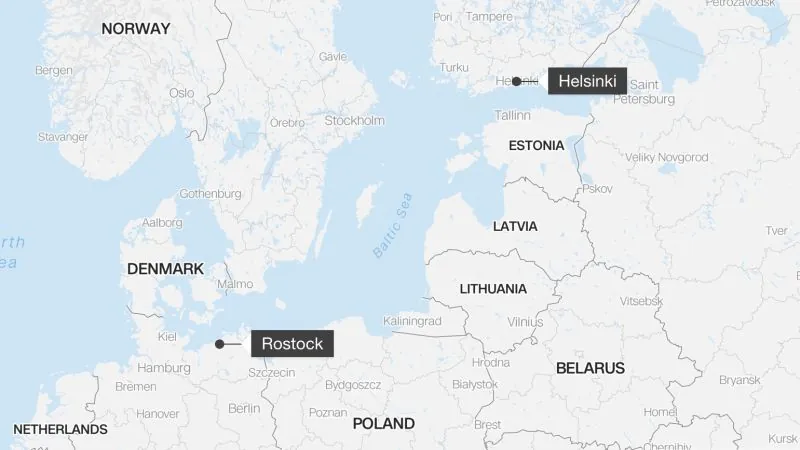
Undersea Internet Cables in the Baltic Sea Cut: Are We Facing Hybrid Warfare?
2024-11-18
Author: Ting
Undersea Internet Cables in the Baltic Sea Cut: Are We Facing Hybrid Warfare?
In a shocking turn of events, two critical undersea internet cables in the Baltic Sea have been disrupted, raising alarming concerns about possible Russian interference with vital global infrastructure. Telecommunications companies report that a cable link between Lithuania and Sweden was severed on Sunday morning around 10:00 a.m. local time. According to Telia Lithuania, this disruption stems from physical damage to the cable rather than equipment failure.
“This is not a case of malfunction; something has physically damaged the fiber optic cable,” confirmed Audrius Stasiulaitis, a spokesperson from Telia Lithuania, to CNN. The implications of this damage are profound, as the connection handled about a third of Lithuania's internet capacity.
In a related incident, another undersea cable linking Finland and Germany also faced a disruption. Cinia, the state-owned Finnish company that operates this C-Lion cable, is currently investigating the cause. This cable, spanning nearly 1,200 kilometers (approximately 730 miles), is pivotal for data flow between Finland and Central Europe, running alongside crucial energy infrastructures like gas pipelines.
The Finnish-German cable's damage site is notably close—approximately 60 to 65 miles—to the cut cable between Lithuania and Sweden. This proximity has raised further suspicions, leading Finnish and German foreign ministers to express their "deep concern" over these events. They hinted at the possibility of intentional sabotage, suggesting that the recent incidents underscore the precariousness of European security amid ongoing tensions with Russia.
"We are currently investigating the matter thoroughly,” they stated in a joint announcement. "Our security is not only threatened by Russia's aggressive actions in Ukraine but also by potential hybrid warfare tactics employed by hostile entities."
This cautionary stance follows recent warnings from U.S. intelligence, highlighting an uptick in Russian military activity around crucial undersea cables. U.S. officials indicated a growing likelihood of sabotage operations against these infrastructures, which are vital for maintaining global communications.
An investigation by Nordic public broadcasters back in April 2023 had already raised red flags, reporting that Russia was believed to be operating a fleet of suspiciously placed spy vessels in the waters surrounding Northern Europe, focusing on potential sabotage of underwater cables and renewable energy sources.
As tension mounts, the extent of the disruption caused by the troubled C-Lion cable remains unclear. Typically, essential data flows are routed through multiple cables to mitigate the risk of overreliance on any single one. Nevertheless, the operational capabilities of these two impacted cables have far-reaching implications for internet access and economic stability in the Baltic region.
A repair vessel is currently on standby to address the damage, although Cinia has indicated that the repair might take anywhere from five to fifteen days, contingent on weather conditions. The public remains anxious, as the credibility of undersea cable security becomes a focal point in the discourse surrounding geopolitical tensions with Russia.
Both Lithuania and Sweden are enhancing their vigilance, signaling that they are collaborating with military and civil authorities to investigate the matters. With the stakes incredibly high, all eyes are now on Baltic waters; will further revelations emerge that could reshape our understanding of security in this volatile landscape?
Stay tuned as this story develops and unfolds!


 Brasil (PT)
Brasil (PT)
 Canada (EN)
Canada (EN)
 Chile (ES)
Chile (ES)
 España (ES)
España (ES)
 France (FR)
France (FR)
 Hong Kong (EN)
Hong Kong (EN)
 Italia (IT)
Italia (IT)
 日本 (JA)
日本 (JA)
 Magyarország (HU)
Magyarország (HU)
 Norge (NO)
Norge (NO)
 Polska (PL)
Polska (PL)
 Schweiz (DE)
Schweiz (DE)
 Singapore (EN)
Singapore (EN)
 Sverige (SV)
Sverige (SV)
 Suomi (FI)
Suomi (FI)
 Türkiye (TR)
Türkiye (TR)